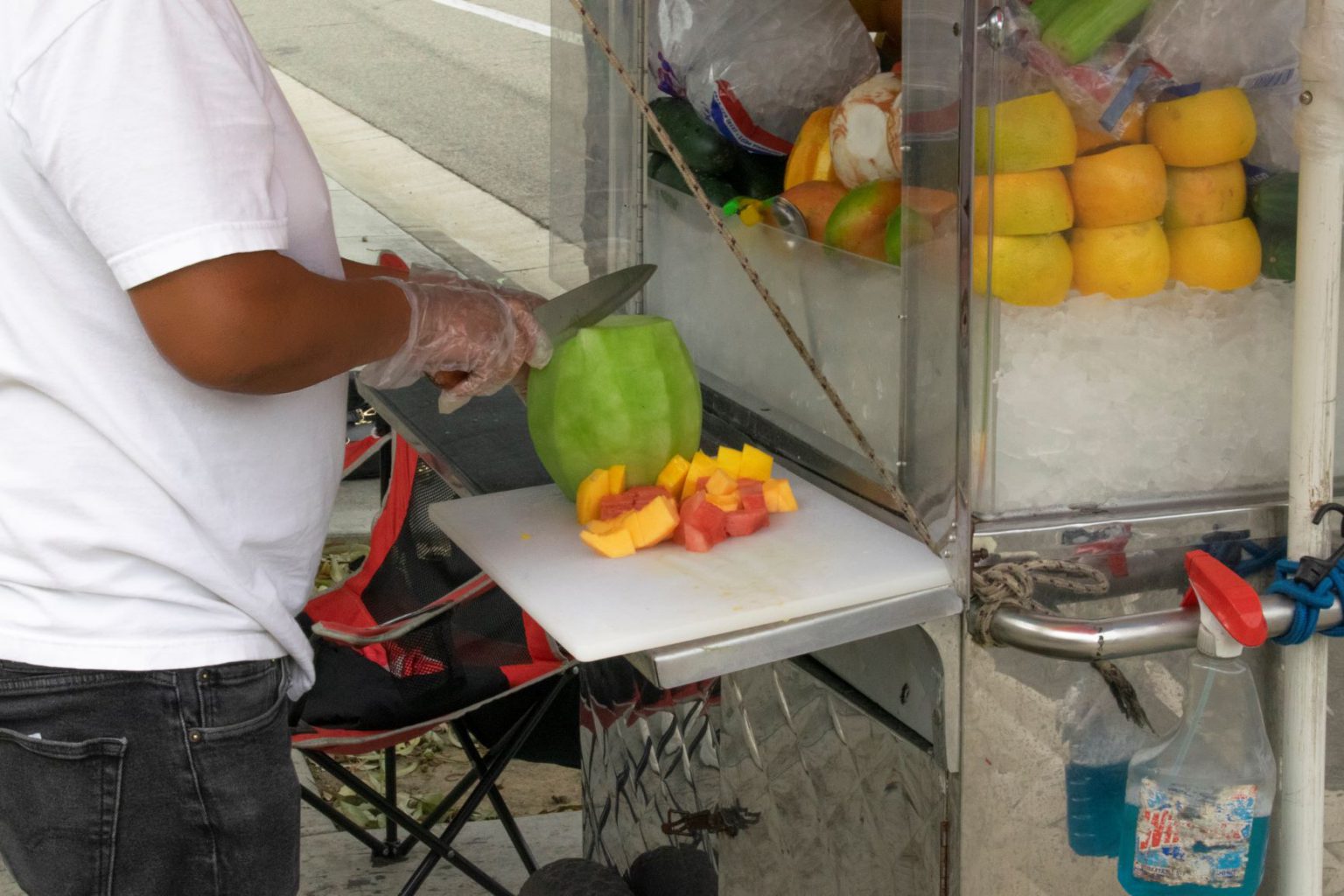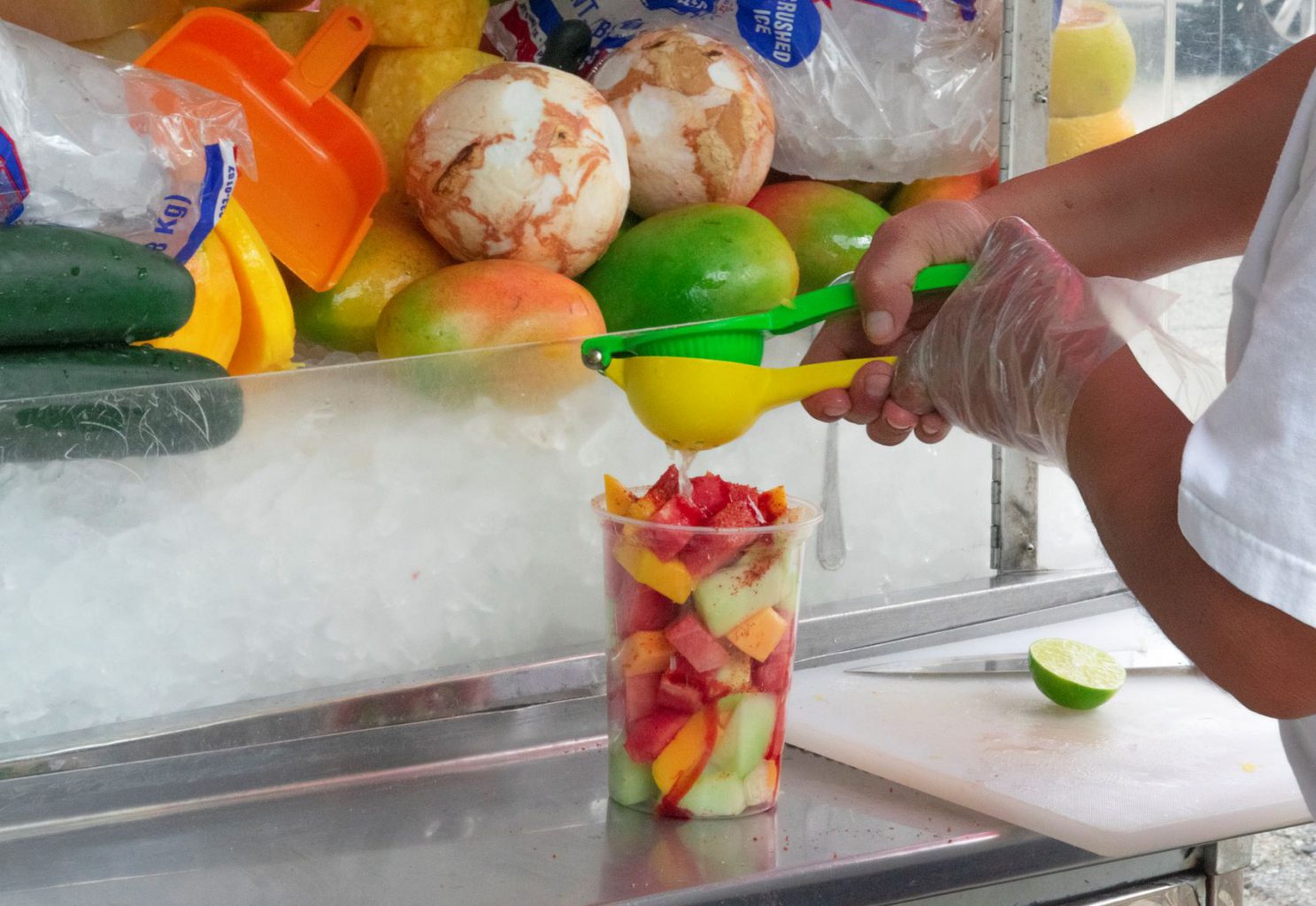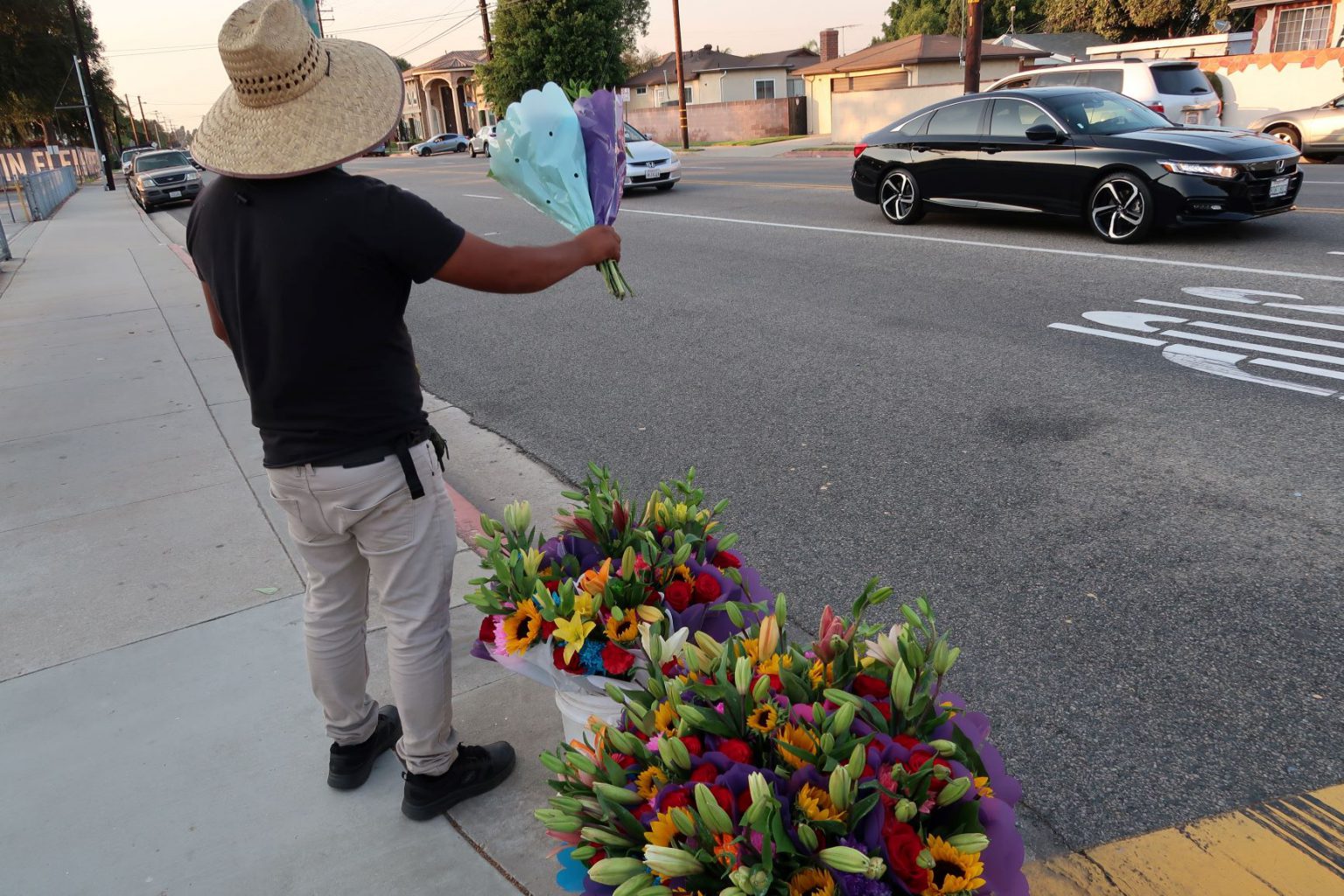
Photo Credit: Mariah Winsborrow
At 5 p.m. on a recent Saturday in October, Maria Matteo parks her fruit cart at a busy intersection in Fullerton, ready to start business for the day. She sells “fruta picada,” which includes mango, cucumbers, oranges, and jicama cut up with lime and tajin. Matteo takes care of her four kids in the morning, and at 3 p.m. she starts her work day, filling the ice chest inside her cart and preparing the fruit by pre-cutting it and arranging the cups. She works until sundown, selling fruit in order to help her husband pay the bills. But she does so at a risk. Like many street vendors in the area, she doesn’t have a permit.
“Yes, I am aware about permits but I take the risk of not having one because I cannot afford one,” explains Matteo.
The city of Fullerton recently legalized street vending, but with mandatory fees and insurance coverage, some officials question whether this will really help street vendors.
Fullerton City Councilmember Ahmad Zahra expressed concern at the Sept. 15, meeting, that high fees in the new city ordinance would make a sidewalk vendor permit unaffordable.
“The spirit of the law is trying to help vendors, especially the lower income, but then suddenly all these costs are coming up that they can’t afford, so even if we’re allowing this… they aren’t going to conform to any of this because they cannot afford it,” said Zahra.
The ordinance went into effect on Oct. 15, 2020, after it was approved by the Fullerton City Council on Sept. 15, 2020. However, enforcement of the new ordinance will not officially take effect until Jan. 1, 2021. Officials say this will give the city more time to publicize the new process and vendors time to request a permit. According to Dave Langstaff, an analyst for the city of Fullerton, the city encourages applicants to obtain their permits as quickly as possible.
Under the new ordinance, the annual fee for a sidewalk vending permit is $80 per cart. But vendors are required to pay a Live Scan fee for electronic fingerprinting of $22, business registration fees of up to $68, and obtain $1 million in liability insurance. The LiveScan fee requirement was conditioned by the police department, to protect the health and safety of Fullerton and its residents. Street vendors typically pay a fee of about $30 per month, or $375 annually for general liability insurance. This policy would protect street vendors against customer injuries and customer property damage.
According to CareerExplorer, the average wage for a street vendor in California is around $13.79 per hour. However, the top 20% can earn up to $31.41 per hour, and the bottom 20% earn $10.83 per hour. This makes the average salary $28,680 in California.
Prior to the approval for sidewalk vendors in the city of Fullerton, they were not permitted unless it was for a specific city event. On Sept. 17, 2018, Gov. Gavin Newsom signed Senate Bill 946, which requires all cities in California to create a permit process for legalizing street vending.

Photo credit: Mariah Winsborrow
Rudy Espinoza, the Executive Director of Inclusive Action for the city of Los Angeles, says it is important for street vendors to be recognized for their hard work and efforts.
“Most of the time, vendors advocate for affordable permits to have an opportunity to build their business and reserve a place, without having to get up extra early,” says Espinosa.
Most vendors just want the opportunity to gain affordable permits to build their businesses so they may be recognized as part of the economic community.
Espinosa expresses, “A city does not have to have a permit. You can create rules for vendors because it is not always about a permit, but having a system that recognizes vendors as a part of the economy is essential.”
The state law declares that sidewalk vending provides economic development opportunities to low-income and immigrant communities, increases access to desired goods, and contributes to a safe public space.
“Obtaining a permit legitimizes their presence to operate within the city’s right-of-way, without questioning or confrontation from police interference,” says Langstaff, the analyst for the city of Fullerton. He adds that the city has a process of guidelines established that vendors must comply with to protect public health, safety, and welfare.
Enrique has been vending “elotes cocidos,” also known as “cooked corn,” for a year and a half in Fullerton. His days usually consist of waking up at 6 a.m. to cook around 50 elotes. At around 10 a.m., he starts his journey to different spots around the city, like in front of the Northgate market and various parks, and opens his truck for business.
“I work for around four hours, and by those four hours I usually sell all of the corn,” says Enrique. Street vending is his main source of income and how he supports his family.
“I don’t have a permit, and I wouldn’t know where to go to get one,” he explains.
In the meantime, the city will begin enforcing permits once they go into effect on January 1, 2021.

Photo by Kiara Espericueta
While some vendors find the permitting process cost prohibitive, others simply don’t know how to access one. Meg Mcwade, the Fullerton public works director, explained that vendors would be monitored on the weekends to make sure they have insurance and are licensed.
“Police and code enforcement are responsible for monitoring vendors. They have to have their license with them and a form of insurance. They will have visible stickers mounted so a mobile viewer can see them,” said Mcwade at the meeting.
Edgar, who also asked to be identified by first name only, has been a street vendor for only 6 months, and he sells bouquets of flowers on the streets of Fullerton. Edgar started vending because he wanted an extra form of income. “I have not had any problems with the city as a vendor, and I hope it stays that way,” says Edgar. He also mentioned he wasn’t aware of needing a vending permit, so he does not have one at the moment. However, Edgar says he is going to work on getting a permit so he can continue street vending.
Langstaff, the Fullerton city analyst, emphasizes that the city is committed to helping vendors through the application process.
“There are community groups and private donors who may be able to sponsor an application,” he explains. The city, however, is unable to sponsor or offer reduced fees to cover application costs.
“Cities need to invest in street vendor programs. There are hundreds of immigrant entrepreneurs who work hard every day to provide for their families, and a lot of women who can’t find a job elsewhere,” explains Espinoza.
